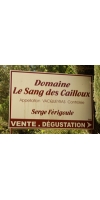Wine from Le Sang des Cailloux

Le Sang des Cailloux Estate
One glimpse of Serge Férigoule’s barbell moustache might be enough for one to be completely enamored with the wines of Le Sang des Cailloux, although they also speak remarkably well for themselves. This domaine’s name means “the blood of the stones,” and Serge Férigoule is most certainly the heart that links the two together. In 1974, Serge left winemaking school with a longing to return to the vineyards. He went to work for Monsieur Ricard’s family in 1979 to oversee the vineyards. Without anyone in his family to succeed him, Ricard decided to gamble by partnering with Serge in 1982. In 1990, after Monsieur Ricard’s retirement, Serge launched Le Sang des Cailloux. Vacqueyras had just been awarded an A.O.C. that same year, a timely twist of fate that helped Serge’s wines to become as celebrated as they deserve.
Le Sang des Cailloux Vineyards
All of Serge’s seventeen hectares rest on the great Plateau des Garrigues, where red clay, limestone, and the famous galets roulés, or rounded stones, impart a terrific intensity and depth to the wines. Given the aridity of the soil, the vines here are naturally prone to lower yields—this gives the wines their concentration and power. That Serge has been farming organically for years but has never sought certification says something about his philosophy. He is not looking to impress; only to make the best wines he possibly can. Serge is also sentimental—each year, the Cuvée Traditionnelle of Le Sang des Cailloux is named for one of his daughters, Floureto, Doucinello and Azalaïs. The “Vieilles Vignes” is also called “Lopy,” named for his hometown. His wines have everything we love about the Rhône – wild and chewy with great notes of leather, spicy garrigue, and smoky, black fruit.
No products found
- back
Selected Options
Wineries
Categories
Pricing
Countries
Regions
Grape Types
Wineries
Organic/Free Shipping
All older vintage wines have been purchased from a single collectors cellar. Pictures can be requested before shipment.
Xavier Intra is 40% Clairette, 25% Grenache Blanc, 15% Picpoul, 10% Roussane, & 10% Autres cépages.
This white Châteauneuf-du-Pape from Vinarium® is a veritable ode to innovation, unprecedented in the history of French wine! It is the result of a unique aging method: small barrels were immersed in the Vinarium®, a truncated wooden vat, completely sheltered from oxygen.
This wine was aged under pressure in immersion for thirty months.
This white Châteauneuf-du-Pape from Vinarium® is a veritable ode to innovation, unprecedented in the history of French wine! It is the result of a unique aging method: small barrels were immersed in the Vinarium®, a truncated wooden vat, completely sheltered from oxygen.
This wine was aged under pressure in immersion for thirty months.




